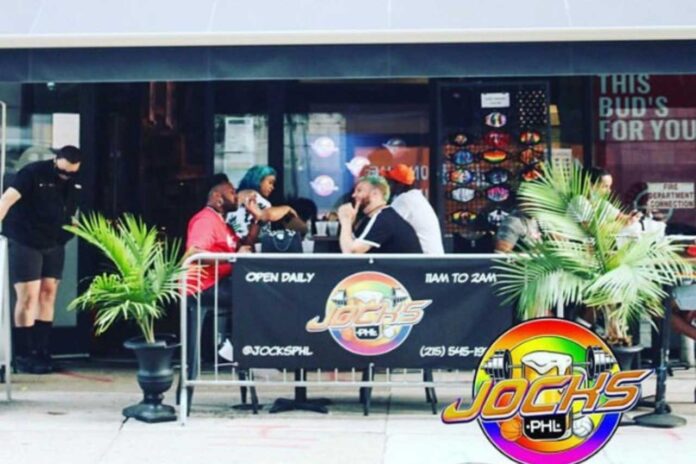With Pennsylvania reporting 565 new cases this past Monday, the COVID-19 pandemic is far from over. Here in Philly, businesses have been especially hard hit as many customers continue to shelter in place and adjust their spending. Last month the gayborhood coffee shop Square One closed permanently, along with many businesses along Walnut and Chestnut Streets. And it’s not just smaller businesses who are feeling the loss. Major retailers including Neiman Marcus, and Lord & Taylor have filed for bankruptcy during the crisis.
Businesses that have endured the pandemic are having to get creative to survive, including our local LGBTQ businesses.
A perennial favorite among Philadelphia shoppers regardless of sexual orientation is Philly AIDS Thrift. With the main location on South Fifth Street in Queen Village as well as Giovanni’s Room at 12th and Pine in the gayborhood, Philly AIDS Thrift functions as a retail non-profit supporting those living with or affected by HIV/AIDS.
“Like most businesses, we’ve experienced a bit of reduced foot traffic. But our first day open there was a line of people, socially distanced, to the corner,” said Christina Kallas-Saritsoglou, co-founder and manager since 2005. “Right now, in order to keep everyone safe during this reopening phase, we are not currently on-boarding new volunteers.”
The business, which last year gave nearly a quarter million dollars to Philly’s HIV/AIDS service agencies, has more than just paying bills and employees to worry about. Fortunately, Both Kallas-Saritsoglou and manager Adam Proctor confirmed there have actually been increases in donations to the store, thereby allowing them to keep going strong.
“There are some days we can see 400 bags or more of clothing coming in, as well as boxes of bric-a-brac and furniture donations. People have been at home for months with nothing to do but clean,” Proctor added.
Philly AIDS Thrift also maintains Giovanni’s Room, which is one of the largest online and offline hubs for queer books. Giovanni’s Room reopened for in-person business on June 19th, and recently published its first anthology featuring writing by community members.
Just outside of the city, Novus Adult Care Services (Novus ACS) caters to individuals living in more rural areas. With locations in Stroudsburg in the Poconos, Bethlehem in the Lehigh Valley, Doylestown in Bucks County, and Leighton in Carbon County, they offer HIV testing and PrEP support for sexually active adults. Currently, they give care to at least 100 HIV+ people.
Benny Vukaj, who has been with Novus ACS for what he calls “three wonderful years,” serves as their marketing director. He says that, despite people being decidedly less sexually active in this age of social distancing, they have not seen a decrease in demand for testing and PrEP. In fact, they tested 1000 people in July.
“Our staff will work with those who need to schedule an office visit for needs that cannot be met over the phone or online,” Vukaj explained. “We understand these are difficult times for everyone and the public needs to know that they have options. We are here for you if you are not getting the care you need or deserve.”
For many businesses it can be difficult to operate remotely. This is doubly true for new businesses that rely on foot traffic like Jocks PHL on Walnut Street. Ben Adalo, Jr., the general manager, said the bar opened just two weeks before the shutdown.
‘We are looking forward to a big opening party when we can,” Adalo said. adding that business has been doing well and they have actually had to increase staff. “Everything has been going well, we have increased business with our to-go cocktails and our sidewalk cafe.”
The owners of the bar were also very conscientious to the well being of their employees. Adalo, Jr. said they made sure to keep their employees paid despite having to shut down so soon after opening.
Over on Pine Street, Markus Aman, the owner of The Lion’s Mane salon, has been open for 17 years. While the business is well established, Aman recently bought his former business partner out and has had to get quickly up to speed in order to keep the salon functioning.
“This year has definitely brought about the most exceptional amount of changes,” said Aman, who didn’t imagine himself having to apply for business grants to curtail the financial losses of the pandemic. “Luckily, my landlord was willing to let me negotiate my lease. Other businesses have not been so lucky.”
Aman said he had to buy new equipment to keep everything up to Pennsylvania standards enacted for close-contact businesses like salons.
“It feels a little bit more sterile, more like a medical office than a salon,” he added, but fortunately his clients still keep coming back even though services and products are diminished currently. “And we’re not even blow drying. There are studies that say a hairdryer can spread the virus 30 feet; while other studies say the heat kills the virus on hair.”
Zach Wilcha, executive director of the Independence Business Alliance (IBA), has heard some touching stories about how local business owners have banded together, including sharing contacts with each other and checking in on fellow entrepreneurs. Likewise, the IBA has kept its members together through virtual networking events. But Wilcha is not sugar-coating the realities of life for companies during and after the pandemic.“We are hearing various levels of success of staying open right now, but the permanent closings are more of a danger the longer the crisis lasts. I worry that when minority owned businesses shut down, many other organizations, some of them corporate and city-based, will lose their suppliers,” Wilcha told PGN. “Companies in the IBA often supply local arts organizations and nonprofits, and the ripple effects from their closures could be tremendous.”

